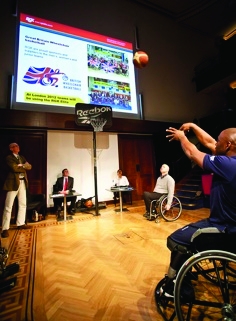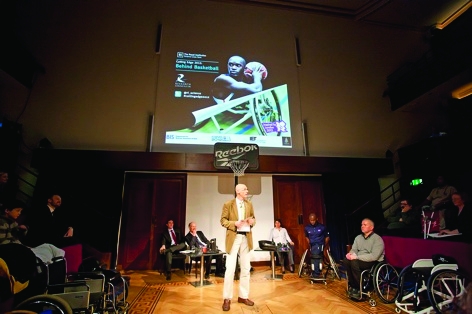For anyone in the UK, 2012 is going to be an exciting year. At long last, Olympic year is here – it seems like a lifetime since we were awarded the Olympic games in Singapore back in 2005. And now it’s here it’s like the afterburners have been switched on. Behind the scenes, our research has been done and the sports themselves are preparing themselves calmly for the games. On the periphery, however, it feels slightly chaotic with sports blogs, articles, research papers, books, science festivals and lectures.
My first Olympic-themed science lecture of 2012 was at the Royal Institution in London in the first of a series of lectures funded by Research Councils UK (RCUK). Opened by David Willetts, the Minister for Universities and Science, the first event was about wheelchair basketball. While the audience learnt about the science behind the sport, we used voting pads to find out what the audience thought of science and sport.

And what did we find out? First of all, who they were: two thirds male with 60 percent younger than 35 - perhaps what might be expected in a basketball audience. But wait, the majority turned out to be science-lovers (85 percent) rather than basketball-lovers (27 percent). It was no surprise, then, to find out that 9 out of 10 thought that science and technology had benefited sport. When it came to the use of performance enhancement, around 60 percent thought that caffeine and climate chambers were OK. However, the use of blood doping or a relaxation of anti-doping policy was a definite no-no.
So what about equipment and physical technology? Well, around half thought that it was OK for a country to develop sports equipment solely for their own athletes and 70 percent thought that any technology should be allowed in training. Confusingly, however, 60 percent thought that athletes should be forced to use the same equipment during a competition.

My final question found that a majority (62 percent) thought there was a clear difference between the use of technology and doping.
I’m not sure how reflective of society in general these answers were, but it’s only the first of six events and it’ll be interesting to see the difference across the country and with different sports. Who will like technology more, triathletes or divers? And will those who don’t like science and engineering be indifferent to the use of technology?
Details of the events can be found here.











UK Enters ‘Golden Age of Nuclear’
The delay (nearly 8 years) in getting approval for the Rolls-Royce SMR is most worrying. Signifies a torpid and expensive system that is quite onerous...